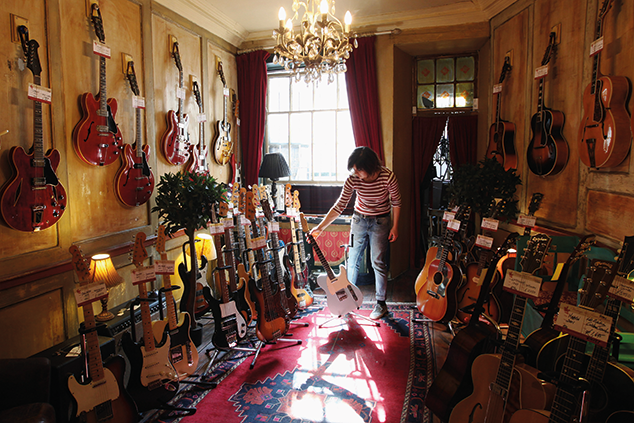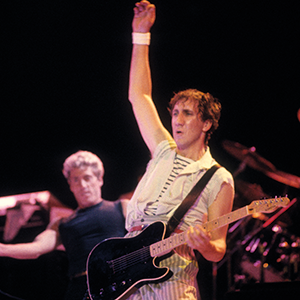Classic guitars going for a song
Classic guitars sound great, but are they a good investment? Mick Sharp reports.

Get the latest financial news, insights and expert analysis from our award-winning MoneyWeek team, to help you understand what really matters when it comes to your finances.
You are now subscribed
Your newsletter sign-up was successful
Want to add more newsletters?

Twice daily
MoneyWeek
Get the latest financial news, insights and expert analysis from our award-winning MoneyWeek team, to help you understand what really matters when it comes to your finances.

Four times a week
Look After My Bills
Sign up to our free money-saving newsletter, filled with the latest news and expert advice to help you find the best tips and deals for managing your bills. Start saving today!

Classic guitars sound great, but are they a good investment? Mick Sharp reports
If a guitar lover died and went to heaven, there's a good chance it would look something like the interior of one of the vintage and classic guitar shops on London's iconic Denmark Street. Known colloquially as Tin Pan Alley, the street was home to numerous popular-song publishers in the 1960s, giving way to a vast selection of music shops with a worldwide reputation as "the place to go".
Sadly, Denmark Street is now a shadow of its former self, giving way to commercial development and Crossrail and slowly, but surely, having its unique character nibbled away. A petition to stop the redevelopment garnered 10,000 signatures, but to no avail.
MoneyWeek
Subscribe to MoneyWeek today and get your first six magazine issues absolutely FREE

Sign up to Money Morning
Don't miss the latest investment and personal finances news, market analysis, plus money-saving tips with our free twice-daily newsletter
Don't miss the latest investment and personal finances news, market analysis, plus money-saving tips with our free twice-daily newsletter
Despite the scaffolding and builders' lorries, one store No.Tom still shines like a beacon as a repository for some of the most cherished and valuable guitars available today. There you will find an eclectic selection of rare, vintage and highly desirable instruments, many of which have graced the most prestigious stages in the world, in the hands of some of the biggest names in the music business.
Big names
You will find all the big names of the guitar industry Fender, Gibson, Rickenbacker, Vox and Paul Reed Smith to name but a few. Fancy forking out £98,000 for a 1941 Gibson SJ-200 with horseshoe inlay? Step right in, sir. Or maybe a 1958 Fender Stratocaster in three-tone sunburst at a giveaway' £18,800? Walk this way, madam. There are numerous other emporia, both "real" and online, out there such as Hank's (also on Denmark Street) and Vintage 'n' Rare in Bath all trying to tempt fretboard fans with similarly star-studded stock.
Your average working musician may not be known for having particularly deep pockets, but the vintage and rare guitar market is as busy and healthy as it has ever been. So do these guitars make for good investments?
Guitars as an investment
If you take a punt on a vintage instrument there is one advantage over other assets: you can enjoy your investment as it hopefully appreciates. All guitars benefit from actually being played, but even if you're not a six-string wizard the appeal is not limited to those who can get a tune out of the wood and wire. They're rather nice to look at, too.
Nashville-based George Gruhn and Walter Carter know as much if not more about the market for vintage fretted instruments than anyone. Now in its third edition, Gruhn's Guide To Vintage Guitars (Backbeat Books, £19.99, Amazon) is a good place to start researching the market. "Vintage instruments often outperform the stockmarket," says Gruhn. "A guitar fund' made up of a cross-section of models is likely to perform in a similar way to a diversified stock portfolio, without too much risk."
Timing is everything
As with all investments, timing is everything. Vintage Guitar magazine recently set up an imaginary "guitar index" of 42 vintage instruments to see how their value compared with the Dow Jones average over the past 15 years. If you had invested in the instruments in the index before 1991, starting point for the virtual index, you would be singing a very happy tune today. Guitars that cost $153,000 in 1991 could have been bought in 1980 for roughly $37,550, and in 1970 for around $15,100. From 1963-1975, vintage fretted instruments increased in value as much as 25% per year.
Relatively speaking, the vintage-guitar market is small. The entire musical-instrument business in the United States which covers everything from instruments, sheet music, pianos, even karaoke is just $7bn annually, with vintage instruments accounting for $100-$200m. Compared with the trillions of dollars that change hands every day on the New York stock exchange, you're talking about a four-bar intro compared with Bohemian Rhapsody.
Big returns are far from guaranteed buy for the fun of it and don't rely on your collection to fund your retirement. But still, if you stick to the biggest names Gibson, Fender, Gretsch, Rickenbacker and time your purchase right, you may get lucky and have a hit on your hands.
Star-studded six strings
Instruments formerly owned by famous guitarists are about as close to a "cert" as you can get if you're buying as an investment.
Take a glance at VintageAndRare.com and you'll get a feel for the kind of hair-raising prices fetched for star-studded six strings.

Either record sales have dried up somewhat for hairy rocker Lenny Kravitz or maybe he's getting a bit cramped for space in his LA mansion, but a couple of his "axes" could be yours for just over £7,000 each. Available are a 2014 Gibson Les Paul Custom one pick-up model, and a white 2014 Gibson ES-Les Paul. If your budget is slightly larger, Kravitz's 1956 Fender Stratocaster in two-tone sunburst will set you back £33,933.
Joe Satriani played his 1927 Gibson L-1 on an MTV Unplugged TV special; you could put on a show of your own with it for £19,381. And if jazz fusion is your musical cup of saki, £78,449 will buy you a 1954 Fender Stratocaster that has been carefully toted around the world's biggest stages by the legendary Eric Johnson.
Get the latest financial news, insights and expert analysis from our award-winning MoneyWeek team, to help you understand what really matters when it comes to your finances.
Mick is a former writer and production editor for MoneyWeek and he wrote about art and how to spend your money. He was also a writer for The Week online. Previous to that, Mick was a production editor at MJS Media for 30 years and now he is a production editor at The Open University. Mick is also an experienced website designer.
-
 Should you buy an active ETF?
Should you buy an active ETF?ETFs are often mischaracterised as passive products, but they can be a convenient way to add active management to your portfolio
-
 Power up your pension before 5 April – easy ways to save before the tax year end
Power up your pension before 5 April – easy ways to save before the tax year endWith the end of the tax year looming, pension savers currently have a window to review and maximise what’s going into their retirement funds – we look at how
